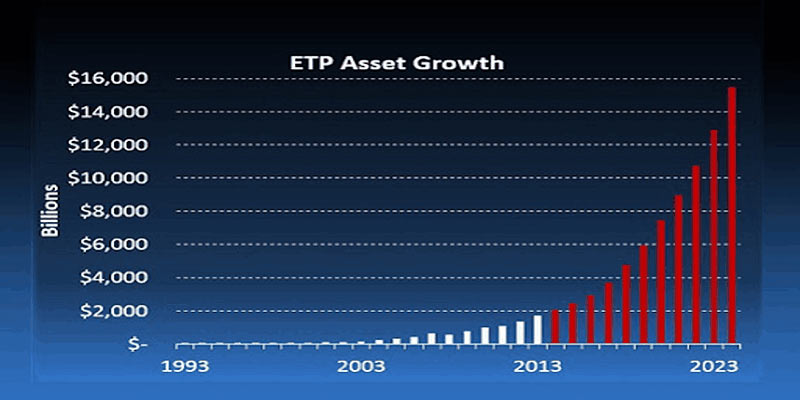Are you looking to understand how to evaluate the quality of EPS (earnings per share)? If so, then you've come to the right place! In this blog post, we'll demystify what EPS is and discuss several critical elements that can help assess its quality.
We'll also explain why these factors are especially important for investors traders, and analysts who aim to make better-informed decisions when judging a company's financial performance.
Investing involves risk, and individuals should research before allocating their hard-earned capital.
With that said, by the time you have finished reading this blog post, you will have a clearer idea of how one key measure - earnings per share - can be assessed for its value. Let’s dive in!
What Is EPS?

EPS, or Earnings Per Share, is one of the most important indicators of a company's financial performance. It's calculated by dividing total earnings (after taxes and other deductions) by the number of outstanding shares on the market.
This figure gives investors an accurate snapshot of how much each shareholder gets if all profits are divided among them. It's a great way to compare companies in the same sector and ensure their financial performance is on par.
EPS Quality

A high-quality EPS indicates a company's financial health and stability, reflecting its profitability. While there is no guaranteed formula for evaluating a company's EPS, certain key metrics can help you assess its quality.
The first factor to consider is the "earnings yield" or "return on assets," which measures how efficiently a company uses its assets to generate income.
This metric helps investors identify companies that have stronger financial resources as well as those with higher rates of return on their investments.
What Is a Good EPS?
A good EPS should be above the industry average, which can vary depending on the sector. Generally speaking, a high return on assets is considered a sign of financial strength and stability. Additionally, companies with higher rates of return tend to attract more investor capital, which can lead to better stock performance over time.
Key Factors To Evaluate EPS Quality
When it comes to judging the quality of a company's earnings per share (EPS), there are several key metrics that investors, traders, and analysts should consider:
1. Operating Margin:
Operating margin measures how much of a company's revenue is converted into profit after accounting for all operating expenses. Companies should have an operating margin above 25% to be financially healthy.
2. Return on Equity (ROE):
This measure tells investors how efficiently a company utilizes its shareholders' equity to generate profits. Generally, the higher the ROE, the better it indicates that management generates profitable returns from invested capital.
3. Earnings Growth:
It's important to keep track of a company's EPS growth over time as it can provide insight into the financial health of a business and whether or not its strategies are succeeding in driving profitability. If there's no growth in earnings despite increasing sales, it's a warning sign that the company may need to be more efficient in utilizing its resources.
4. Cash Flow:
A strong cash flow is essential when evaluating the quality of EPS, as it can provide insights into a company’s liquidity and ability to pay its bills. Companies with strong cash flow often have higher EPS than those with weak cash flow.
5. Debt-to-Equity Ratio:
This metric is important for evaluating the ability of a company to generate sufficient returns from its equity investments. Companies with higher debt-to-equity ratios tend to have less financial flexibility and lower rates of return on their investments, which could lead to lower EPS quality.
Why Evaluate EPS Quality?
Analyzing a company's EPS can provide investors with valuable insights into its financial performance and whether or not it is a viable investment opportunity.
It also helps traders identify potential opportunities in the market by comparing the earning potential of different stocks.
Moreover, analysts use this data to assess companies' overall profitability and make more informed decisions when recommending stocks.
Ultimately, evaluating the quality of EPS is an important tool for any investor looking to make better-informed decisions about their investments. Considering all these key metrics, they can better clarify how their money is used and evaluate the risks associated with different opportunities.
Different Types of EPS and Their Uses
EPS (earnings per share) can be broken down into two main types - basic EPS and diluted EPS. Understanding these metrics' differences is essential for investors, traders, and analysts alike, as each type may have different implications for a company's financial performance.
Basic EPS
Basic EPS is the most commonly used earnings per share measure. It measures the earnings available to common shareholders and is calculated by dividing a company's net income (or profit) by its total number of outstanding shares.
This measure is useful for assessing the profitability of a business and provides insight into how well management has been able to manage costs, generate revenue, and increase profits over time.
Diluted EPS
Diluted EPS goes further by considering the potential dilution of earnings that could arise from issuing additional shares. This metric measures the company's profitability if options, warrants, or convertible debt were exercised.
By including these forms of potential dilution in the calculation, investors can get a more accurate view of how much earnings per share are available to shareholders.
Learn How to Test the Quality of EPS
When judging the quality of a company's financial performance, evaluating EPS (earnings per share) is essential. EPS tells us how much each shareholder would receive in dividend payments if any were distributed from the company’s profits.
In other words, EPS indicates how profitable a business is and how well it allocates its resources.
So, how can investors, traders, and analysts determine the quality of EPS? Here are a few key elements to consider:
1. Earnings Trend: A company’s earnings trend over time is one of the best indicators for judging the overall quality of its EPS. Look for consistent growth in earnings per share each quarter or year, as this indicates a healthy business.
2. Earnings Quality: It’s also important to look for earnings quality instead of quantity. For example, suppose a company reports high earnings per share but relies heavily on one-time items or non-recurring gains. In that case, that should be considered when evaluating the overall quality of EPS.
3. Revenue Growth: Finally, a company’s revenue growth should be closely monitored when assessing the quality of EPS. If a company’s earnings per share are increasing, but its total revenue is stagnant or declining, that could be a sign of trouble ahead.
FAQs
How do you measure the quality of earnings?
Earnings quality can be evaluated by assessing a company's accounting practices, underlying operations, and financial reporting. Analysts should also consider the potential for management manipulation of earnings.
What is the high-quality earnings ratio?
The high-quality earnings ratio measures the quality of a company's reported earnings, which can help investors identify firms with sustainable profitability and strong corporate governance.
What is the most important factor when evaluating EPS?
The most important factor to consider when evaluating EPS is whether a company's reported earnings are accurate and reliable. Analysts should look for signs of aggressive or conservative accounting practices, underlying operational performance, and potential manipulation by management.
Conclusion
Evaluating EPS is essential for making informed decisions in the stock market. Investors can make better-informed investment decisions by understanding EPS and examining critical elements such as growth rates, future projections, industry comparisons, etc. To ensure success in the stock market, it’s important to research and consult a financial advisor before making any decisions. Taking the time to thoroughly evaluate EPS can help you make better investments for long-term success.
Happy investing!




